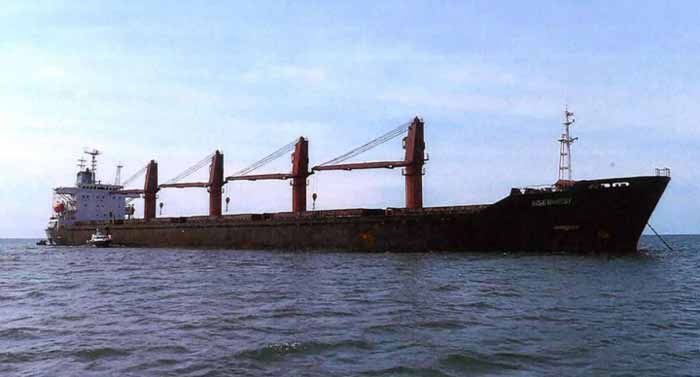
The North Korean bulk cargo carrier formally seized by the United States this week could become an auction item or a training boat for Navy SEALS.
The Wise Honest, North Korea’s second-largest cargo vessel, is on its way to American Samoa after federal prosecutors said Thursday that the ship was seized because it carried banned exports of North Korean coal.
“Today’s civil action is the first-ever seizure of a North Korean cargo vessel for violating international sanctions,” U.S. attorney Geoffrey S. Berman said in a statement from the Justice Department.
“Our Office uncovered North Korea’s scheme to export tons of high-grade coal to foreign buyers by concealing the origin of their ship, the Wise Honest,” the statement continued. “This scheme not only allowed North Korea to evade sanctions, but the Wise Honest was also used to import heavy machinery to North Korea, helping expand North Korea’s capabilities and continuing the cycle of sanctions evasion. With this seizure, we have significantly disrupted that cycle. We are willing and able to deploy the full array of law enforcement tools to detect, deter, and prosecute North Korea’s deceptive attempts to evade sanctions.”
The seizure begs the question: what does the US do with the 17,000 ton ship?
As evidence of a criminal scheme to evade international sanctions, the ship is now an asset subject to forfeiture proceedings, federal prosecutors said.
“Following the approval of the forfeiture by Court, the Attorney General may direct the disposal of the property by sale or any other commercially feasible means,” said Nicholas Biase, spokesman for the U.S. Attorney’s office for the Southern District of New York.
Assets seized by the feds are often put up for sale at auction. If that’s what happens in this case, then the Wise Honest could be purchased and put back into service as a commercial ship.
“Frankly, members of the American public could have an opportunity to buy it,” said Sharon Levin, a former federal prosecutor now in private practice at WilmerHale in New York. “Someone could buy it and turn it into a party boat or cruise ship and the money could ultimately go toward victims of terrorism.”
Levin, the former chief of the Money Laundering and Asset Forfeiture Unit of the Southern District of New York, referred back to the sale of another large asset that had been used to help compensate terror victims: a skyscraper in New York City at 650 Fifth Avenue.
The building had allegedly been owned by Iran and was seized in the largest terror-related civil forfeiture in U.S. history. A court-approved plan to sell the building calls for the proceeds to go to victims of Iranian state-sponsored terrorism.
If there is no sale, the vessel could also be sunk or used by the Navy or another branch of the service for training, according to a source familiar with the case who was not authorized to speak publicly about it.






